Crisis in Jerusalem: Violence between Israelis and Palestinians leaves dozens dead; understand reasons for the recent escalation
Violent clashes took place outside the Al Aqsa mosque in the Old City of Jerusalem
* Report updated at 3:30 pm on May 11, 2021, with new developments in the escalation of violence
Jerusalem has been the scene of weeks of unrest and violence at a level not seen for years, in a new escalation of tensions between Palestinians and Israeli security forces that has left dozens dead and hundreds injured.
On Tuesday evening (11/5 local time), the Islamic group Hamas, which controls the Gaza Strip, said it had fired more than 130 rockets into the Israeli city of Tel Aviv, in reaction to an air strike by Israel that, according to local authorities, destroyed a Palestinian residential tower. The 13-story building had just been evacuated when it was hit.
"We are going to fulfill our promise to launch a massive rocket attack on Tel Aviv and its suburbs in response to the enemy attack on residential towers," says a Hamas statement sent to Reuters.
srael, meanwhile, claimed to have hit 150 targets in Gaza. Health officials estimate that at least 28 Palestinians were killed, including at least nine children.
Israel says 15 members of the Palestinian group Hamas, which controls the Gaza Strip, are among the dead.
Building was demolished on Tuesday by Israeli attack on Gaza
The international community urged both sides to stop the escalation of the conflict, which follows days of clashes in Jerusalem.
Rockets were fired from Gaza to Jerusalem on Monday (10/05)
United States Secretary of State Antony Blinken said Hamas must end rocket attacks "immediately", adding: "All sides need to slow the escalation".
White House spokeswoman Jen Psaki said US President Joe Biden is seriously concerned about the violence.
But Prime Minister Benjamin Netanyahu defended Israel's action "with great force", saying the Hamas group "has crossed a red line".
The most recent clashes in Jerusalem took place on Monday in front of the Al Aqsa mosque in the old city. Palestinians threw stones at the Israeli riot police, who fired rubber bullets and tear gas.
The Palestinian Red Crescent (humanitarian movement similar to the Red Cross) said on Monday that more than 300 Palestinians had been wounded in the morning.
The Israeli police force said 21 policemen were injured, three of whom required hospital treatment.
These are the worst clashes of this kind in Jerusalem since 2017, fueled in large part by an attempt by Jewish settlers to claim ownership of Palestinian family homes in East Jerusalem annexed to Israel. This imbroglio over houses has been dragging on for years.
More than 300 Palestinians were injured during the clashes
Check below three important points to understand the growing tension in Jerusalem.
1. Jerusalem Day
Clashes between Palestinians and Israeli security forces took place over the weekend and worsened on Monday around the Al Aqsa mosque. The mosque is located on an esplanade known by Muslims as Haram al Sharif, or Noble Sanctuary, and by Jews, as the Temple Mount.
Israel's police force said thousands of Palestinians set up barricades on the site Monday night with stones and Molotov cocktails in anticipation of a clash during a planned Jewish march to mark Jerusalem Day.
Prime Minister Netanyahu defended policing.
"This is a battle between tolerance and intolerance, between lawless violence and order," he said. "The elements who want to expropriate our rights periodically oblige us to remain firm, as the Israeli police are doing."
For his part, the president of the Palestinian National Authority (ANP), Mahmoud Abbas, condemned Israeli actions.
"The brutal attack by Israeli occupation forces on the faithful at the holy mosque of Al Aqsa and its terrace is a new challenge for the international community," said its spokesman, Nabil Abu Rudeineh.
The conflicts began on the eve of Jerusalem Day, when the so-called March of the Flag takes place, in which Israelis celebrate Israel's capture of eastern Jerusalem in 1967. It was on that occasion, during the Six Day War, that Israel took control of the entire city.
The Old City is located in East Jerusalem, which is home to some of the most sacred religious sites in the world: the Dome of the Rock and the Muslims' Al Aqsa mosque itself, the Temple Mount and the Wailing Wall, of the Jewish religion, and the Holy Sepulcher of the Christian religion.
It is considered the most sacred city for Judaism and Christianity, and is the third most sacred city in Islam.
East Jerusalem's fate is at the center of the Israeli-Palestinian conflict, and both sides claim their right over the city. Israel regards the entire city as its capital, although it is not recognized as such by the majority of the international community. Palestinians claim East Jerusalem as the future capital of a future independent state.
Normally, during the March of the Flags, hundreds of young Israelis wave flags and walk through Muslim areas, singing patriotic songs.
Many Palestinians see this as a provocation.
Previously, Israeli police decided to ban Jews from visiting the complex during Jerusalem Day celebrations.
The so-called March of the Flag commemorates Israel's capture of East Jerusalem in 1967 (archive photo)
2. Possible eviction of Palestinian families
Much of the latest wave of violence came amid a legal effort for years by groups of Jewish settlers, who want to evict several Palestinian families from their homes in East Jerusalem's Sheikh Jarrah district.
A lower court decision this year supporting the settlers' claim sparked the ire of the Palestinians.
The Israeli Supreme Court was due to hold a hearing on the case on Monday, but the session was postponed due to disturbances.
3. Tensions during Ramadan
This new wave of violence occurs in the last days of the Muslim holy month of Ramadan.
Tensions have been going on for several weeks and not just in Jerusalem
Tensions have increased since the beginning of the festivities in mid-April, with a series of events that sparked riots.
When Ramadan started, nighttime clashes broke out between police and Palestinians protesting security barriers outside the Damascus Gate in the old city of Jerusalem, which prevented them from meeting there overnight.
But the clashes were not limited to Jerusalem alone. Clashes have also been reported in the northern Israeli city of Haifa and near the West Bank city of Ramallah.
Negotiators of the Quartet for the Middle East - a group formed by the United States, the European Union, Russia and the UN to negotiate the crisis in the region - expressed deep concern about the violence, urging all parties to adopt moderation.
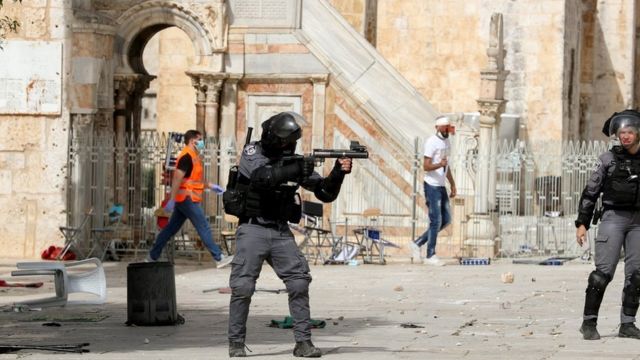
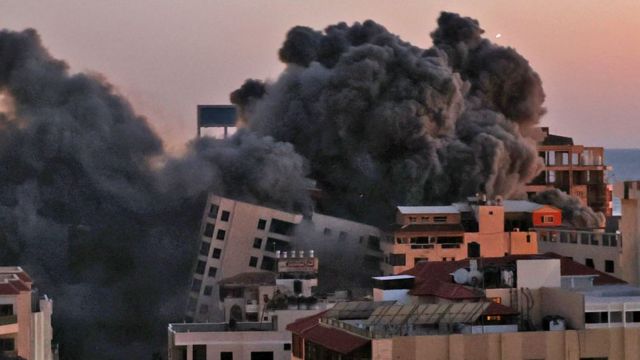
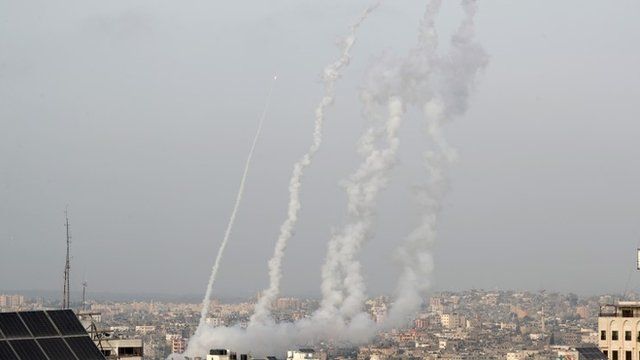
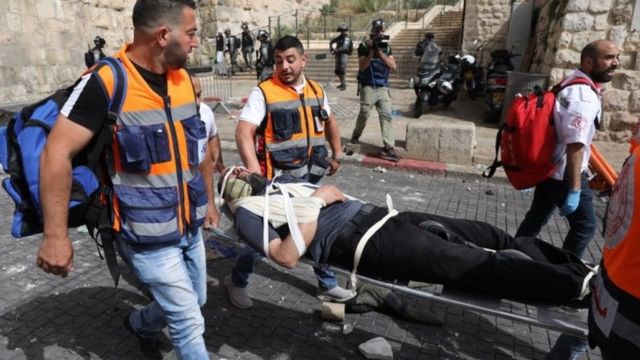
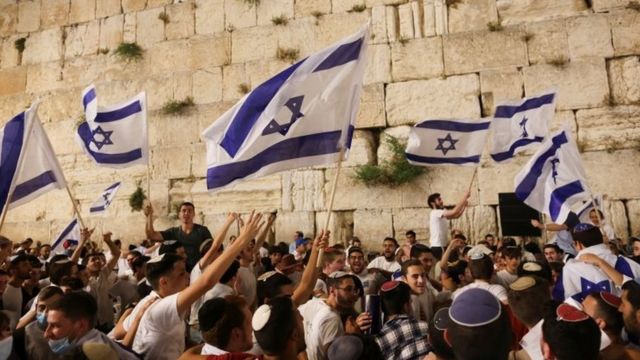
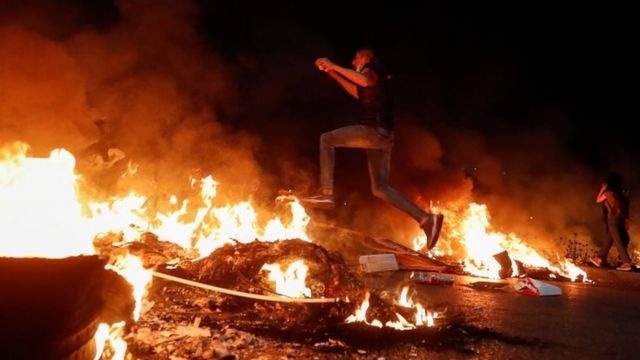

No comments:
Post a Comment